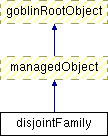
#include <disjointFamily.h>
Inheritance diagram for disjointFamily:

Public Member Functions | |
| disjointFamily (TItem _n, goblinController &_CT) throw () | |
| ~disjointFamily () throw () | |
| void | Init () throw () |
| unsigned long | Size () const throw () |
| unsigned long | Allocated () const throw () |
| char * | Display () const throw () |
| void | Bud (TItem v) throw (ERRange) |
| void | Merge (TItem u, TItem v) throw (ERRange) |
| TItem | Find (TItem v) const throw (ERRange) |
|
||||||||||||
|
|
|
|
|
|
|
Reimplemented from managedObject. |
|
|
Start a single element set.
|
|
|
Unconditional display of data objects.
Reimplemented from managedObject. |
|
|
Retrieve the set containing a given element.
In order to check if two elements x,y are in the same set, it is sufficient to evaluate Find(x)==Find(y) and Find(u)!=UNDEFINED. If the context parameter methDSU is set, Find() does not only lookup the canonical element, but also performs some path compression to reduce the future lookup times. |
|
|
Initialize the disjoint node set structure. After this operation, it is Find(v)==UNDEFINED for every element v. |
|
||||||||||||
|
Merge two disjoint sets represented by arbitrary elements.
|
|
|
Implements goblinRootObject. |